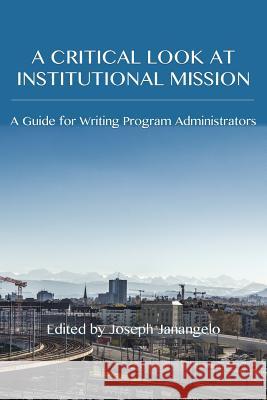A Critical Look at Institutional Mission: A Guide for Writing Program Administrators » książka
A Critical Look at Institutional Mission: A Guide for Writing Program Administrators
ISBN-13: 9781602358409 / Angielski / Miękka / 2016 / 262 str.
A Critical Look at Institutional Mission: A Guide for Writing Program Administrators
ISBN-13: 9781602358409 / Angielski / Miękka / 2016 / 262 str.
(netto: 143,66 VAT: 5%)
Najniższa cena z 30 dni: 148,79
ok. 16-18 dni roboczych.
Darmowa dostawa!
"As a WPA who recently transitioned into being a department chair, I was pulled in from the first paragraph. . . . A Critical Look at Institutional Mission is a welcome gap-filler, focusing on the 'mission' as a fulcrum for academic writing/program-building activities. I think it's a critical collection that confronts the rhetorical power of institutional goals rather than connecting alignment to a more ethereal 'big bad.' . . . T]he book focuses on the mission statement as an artifact that offers insight into our institutional discussions about what we value, how we imagine learning to happen, and how we publicly circulate those ideas." --Colin Charlton
Co-author, GenAdmin: Theorizing WPA Identities in the Twenty-First Century This book helps writing program administrators and writing center directors understand how their work is fueled and constrained by institutional mission. It offers provocations for reflection, conversation, and strategic stewardship of writing programs and writing centers. Mission is a central concept in millennial academe. For many two- and four-year colleges, mission denotes the distinctive institutional history and traditions of practice colleges use to serve students. Yet some traditions may be at odds with marketplace drivers, such as recruitment and retention, institutional rebranding, and social change. WPAs and writing center directors may struggle to reconcile historical practice with contemporary work in civic engagement, undergraduate research, academic advancement, general education, LGBTQI advocacy, and support for students of color. In A Critical Look at Institutional Mission: a Guide for Writing Program Administrators, contributors discuss the complications of teaching and administrating within specific institutional cultures. Reflecting on the restrictions they face, these scholars remind us that our work is rarely ours alone--that we work in community with others, for others, and within institutional contexts and imperatives. Con-tributors include Nicholas N. Behm, Anita R. Cortez, Dominic DelliCarpini, Anita M. DeRouen, Andrea Rosso Efthymiou, Lauren Fitzgerald, Kristine Hansen, Jason Hoppe, Joseph Janangelo, Andrew Jeter, Joyce Kinkead, Jeffrey Klausman, Rita Malenczyk, Steve Price, Lauren Rosenberg, and Farrell J. Webb.
“As a WPA who recently transitioned into being a department chair, I was pulled in from the first paragraph. . . . A Critical Look at Institutional Mission is a welcome gap-filler, focusing on the ‘mission’ as a fulcrum for academic writing/program-building activities. I think it’s a critical collection that confronts the rhetorical power of institutional goals rather than connecting alignment to a more ethereal ‘big bad.’ . . . [T]he book focuses on the mission statement as an artifact that offers insight into our institutional discussions about what we value, how we imagine learning to happen, and how we publicly circulate those ideas.”—Colin Charlton
Co-author, GenAdmin: Theorizing WPA Identities in the Twenty-First CenturyThis book helps writing program administrators and writing center directors understand how their work is fueled and constrained by institutional mission. It offers provocations for reflection, conversation, and strategic stewardship of writing programs and writing centers. Mission is a central concept in millennial academe. For many two- and four-year colleges, mission denotes the distinctive institutional history and traditions of practice colleges use to serve students. Yet some traditions may be at odds with marketplace drivers, such as recruitment and retention, institutional rebranding, and social change. WPAs and writing center directors may struggle to reconcile historical practice with contemporary work in civic engagement, undergraduate research, academic advancement, general education, LGBTQI advocacy, and support for students of color.In A Critical Look at Institutional Mission: a Guide for Writing Program Administrators, contributors discuss the complications of teaching and administrating within specific institutional cultures. Reflecting on the restrictions they face, these scholars remind us that our work is rarely ours alone—that we work in community with others, for others, and within institutional contexts and imperatives. Contributors include Nicholas N. Behm, Anita R. Cortez, Dominic DelliCarpini, Anita M. DeRouen, Andrea Rosso Efthymiou, Lauren Fitzgerald, Kristine Hansen, Jason Hoppe, Joseph Janangelo, Andrew Jeter, Joyce Kinkead, Jeffrey Klausman, Rita Malenczyk, Steve Price, Lauren Rosenberg, and Farrell J. Webb.











